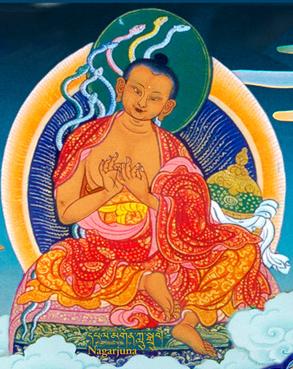Tree of Wisdom: Difference between revisions
Jump to navigation
Jump to search
No edit summary |
No edit summary |
||
| (3 intermediate revisions by 2 users not shown) | |||
| Line 1: | Line 1: | ||
[[Image:Nagarjuna17.JPG|frame]]'''Tree of Wisdom''' | [[Image:Nagarjuna17.JPG|frame]]'''Tree of Wisdom''' (Skt. Nītiśāstraprajñādaṇḍa, Tib. ལུགས་ཀྱི་བསྟན་བཅོས་ཤེས་རབ་སྡོང་པོ་, ''luk kyi ten chö shé rap dong po'', [[Wyl.]] ''lugs kyi bstan bcos shes rab sdong po'') — a [[shastra]] written by [[Nagarjuna]]. It belongs to Nagarjuna’s [[Collection of Advice]]. | ||
This text is a commentary on manners or moral maxims in 260 verses. The original text was in Sanskrit, but has unfortunately been lost. The Tibetan translation is preserved in the [[Tengyur]]. | This text is a commentary on manners or moral maxims in 260 verses. The original text was in Sanskrit, but has unfortunately been lost. The Tibetan translation is preserved in the [[Tengyur]]. | ||
Latest revision as of 23:49, 1 February 2018

Tree of Wisdom (Skt. Nītiśāstraprajñādaṇḍa, Tib. ལུགས་ཀྱི་བསྟན་བཅོས་ཤེས་རབ་སྡོང་པོ་, luk kyi ten chö shé rap dong po, Wyl. lugs kyi bstan bcos shes rab sdong po) — a shastra written by Nagarjuna. It belongs to Nagarjuna’s Collection of Advice.
This text is a commentary on manners or moral maxims in 260 verses. The original text was in Sanskrit, but has unfortunately been lost. The Tibetan translation is preserved in the Tengyur.
Translations
- Dr. C .T. Dorji, Commentary of Manners Called the Tree of Wisdom, Composed by Saint Nagarjuna, Prominent Publishers (Delhi 2000). (Includes Tibetan text and English translation).